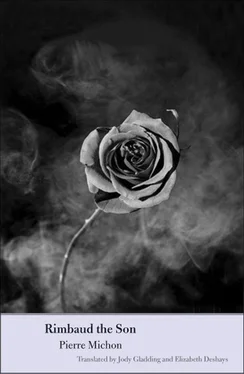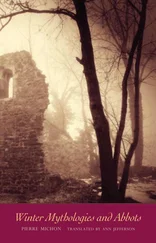Nevertheless he loved Izambard; but the work, the art, made use of Izambard and did not love him.
No doubt the creature of disaster knew that and could not say it, but not Izambard, who could have said it; not Izambard, fresh from teachers college with his gentle air and his cocky ways, his little pince-nez, the quiver of his lip, his hair slightly but not overly long, that fervent republicanism that his whole figure bore, that reserve, decent, timid and brave, which is how he remains, behind the silver chlorides with which the great magic captured him at twenty-two years old. Alas, the poet Izambard knew nothing of all that when he began his school year in 1870, crossed the courtyard under the chestnut trees, caught sight of the little group in caps who were waiting for him there outside the classroom, and straightened up cockily then, nose in the air toward the clear sky and fashioning for himself who knows what azure — an azure without malice in any case: because, out of bravery or timidity, he did not want to see the pall that is behind perfect azures, is basic and fundamental to them, and which it is precisely azure’s mission to conceal, to paint in glory; without which azure is a pot of blue paint, a lapis-lazuli preciosity; and he loved and practiced poetry no doubt, but in the way of those men passionate about hunting, books on hunting, the lovely stories of autumn with feathers and blood, high-sounding words of venery, of falconry, hunting horns in a corner of the woods resounding like an angel, but who, gun in hand and hare with its expressive ears bolting at their feet, begin to tremble, close their eyes and shoot to the side. And when they return they say that it was a good hunt. Neither did Izambard want to kill anyone and nevertheless believed that it would be a good hunt; and if, entering his classroom after lessons and taking a seat at his request, you had asked him what he considered poetry to be, he no doubt would have responded, blushing, becoming flustered, perhaps removing his pince-nez to wipe the condensation with a teachers college handkerchief, and gazing out the window rather than looking at you, he would have answered in a tone of both audacity and panic that it was a matter of the heart thanks to which language is adorned like a bride, or perhaps since Baudelaire, eyes made up, pockmarked, but glorious and adorned like a fine whore — but surely not a dark peasant woman who digs a hole into which language disproportionately plunges and vibrates. He believed that it was good , poetry; that it was entirely on the side of good, the Republic and Awards Day, and not on the side of Sedan and great massacres; that it was one’s duty to remove the obstacles spitefully placed before poetry by evil spirits, which lead to deaths and above all to those invitations to crime, the armband and the kepi: and that, with those garish rags stripped away, each of us would democratically become a poet, because it only takes a childlike imagination, the discipline of rhymes and the freedom of freedom. You would have granted him the discipline of rhymes; as for the rest, no doubt you would have had your reservations and kept them to yourself; but if you found yourself impassioned by this young man’s impromptu speech, your legs stretched uncomfortably under the small desk and your heart nevertheless exalted by the high blossoms in the leaves almost discernible through the window, if thus you had objected that poetry cannot be wholly on the side of good, since our first parents in the Garden of Eden did not speak, communicated in the way of flowers through bees, winged messengers, and would feel their tongues loosen only after the angel had shown them the door; if you had argued that language comes to humans after the Fall, when matter no longer sings; that poetry, which is the language of language, also falls into the universal well and perhaps twice as quickly, unless in its frenzied duplication it ceaselessly climbs back up using all its strength, is almost at the coping, falls back deeper, and so makes use of its free freedom — and if you yourself were indecisive then, searching for words, blurting them out with audacity and panic — then he would have carefully folded the teachers college handkerchief, replaced his pince-nez, and looking you up and down, clearing his throat, would have asked you coldly to which sect you belonged. And you would have blushed in turn, gazed out at the chestnut trees in the evening, and spoken of Sedan.
Although it would not have been Sedan that crossed your lips; you are in that classroom three to six months before Sedan, before Sedan becomes that closed fist in history, when it is still only a garrison in the Ardennes; you would have spoken of Solferino or Sebastopol, some massacre or another, only to emphasize that evil is out there, not in Malherbe but in Louis-Napoleon, not in language but in the aberration of action, flagrant and indisputable when the Carabosse of combat, the goddess of crows, is dancing on dead armies; and to agree heartily with Izambard that the Carabosses are in the armband and the kepi, but not in poetry, which is all good fairy. And Izambard, reassured — not about poetry but on your account — would have accompanied you to the door, said his polite teachers college good-byes, made a Latin joke; and you would have taken leave of him with a Latin joke and much inward respect; because Izambard was one of those men thanks to whom the world can endure, for whom evil is elsewhere, close at hand but outside, omnipresent but remediable, one of that old species of men who fight for the good that they believe they feel inside themselves: and since at twenty-two he thought that Carabosse — I mean Vitalie Cuif this time — was exactly the opposite of poetry, that she was an obstacle in its way, that she was guilty of too much prose and of corrupting the free poetry of her son, he helped Arthur to rid himself of her; and for the future of la poésie française , if that old nightingale still exists, he did well — but not in the way he believed he did well: because as often happens, the mother, dismissed from the affections of the son, repudiated, mocked, excluded from the world and disavowed, the mother disappeared from among the visible creatures and took refuge completely within the son, gathered her old skirts in both hands and leapt wholly into the son, into that dark, never-opened inner closet where, we are told, we are unconscious of our actions and we act; there she rejoined the Captain, who had been there for some time with his sword and his shako; but she made more noise than the Captain. And such things often happen; but it happens less often that the son is Arthur Rimbaud, whose notable actions were only beautiful verses; and it was with the dark fingers that I mentioned, but this time tampering with the son, gripping the son, locked into the son, that the most beautiful verses were spun out two by two: yes, we can imagine that the age-old alexandrine was prodigiously exalted, then irrevocably destroyed in about 1872 by a sad woman who scratched, flailed and raved in a child.
Perhaps after all Izambard had an inkling of that, though it was beyond him. Perhaps when, a year later, Rimbaud mocked and disposed of him in his turn, sold off the good master’s books and put him in the closet, he discerned that poetry was bad; that the old witch whom he believed he was doing in was, in the end, the one who made poetry and would do him in; he could not not perceive all that, anymore than he could admit that he had perceived it: and that is undoubtedly why, knowing but not wanting to know, the poet Izambard forever pissed into the wind. And that is not our concern. We can leave that classroom; put on your top hat, there are boys watching you: they raise their little shakos when you pass them in the shade of the chestnut trees, they take you for the inspector, perhaps one of them is scowling, sticks up his nose conspicuously and keeps his kepi firmly on. Nothing is more beautiful than those May chestnut trees above him. Remaining at his doorway, the rhetoric classroom already dark behind him, Izambard regards the evening shadow and you, leaving, within it, you become that shadow. He is talking to himself in Latin. You did not turn around; what you are seeking is not within Izambard’s domain.
Читать дальше












